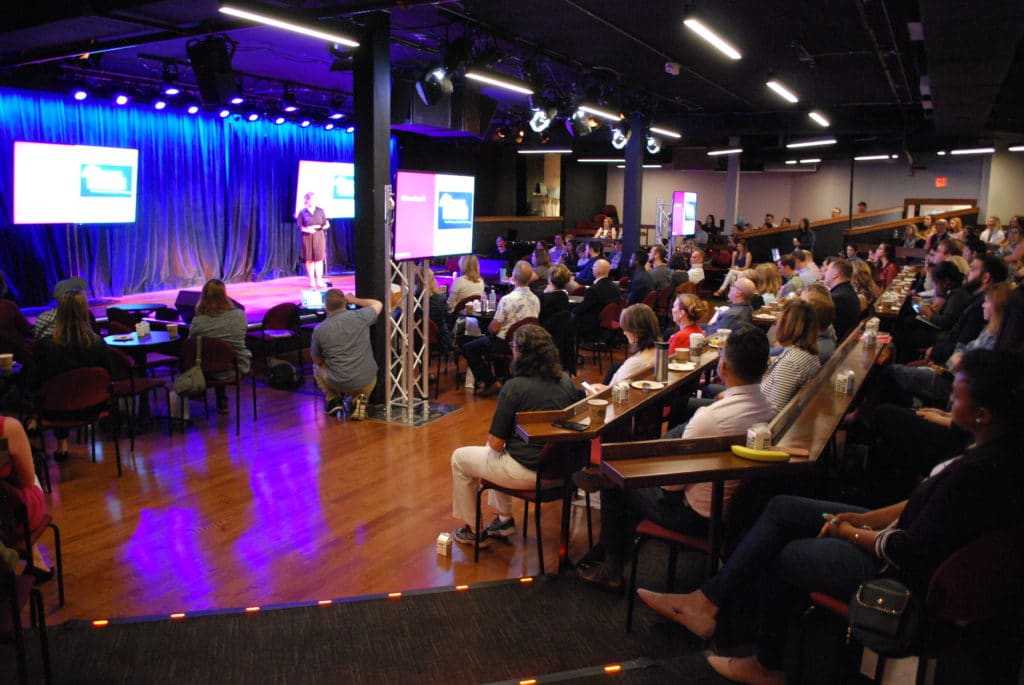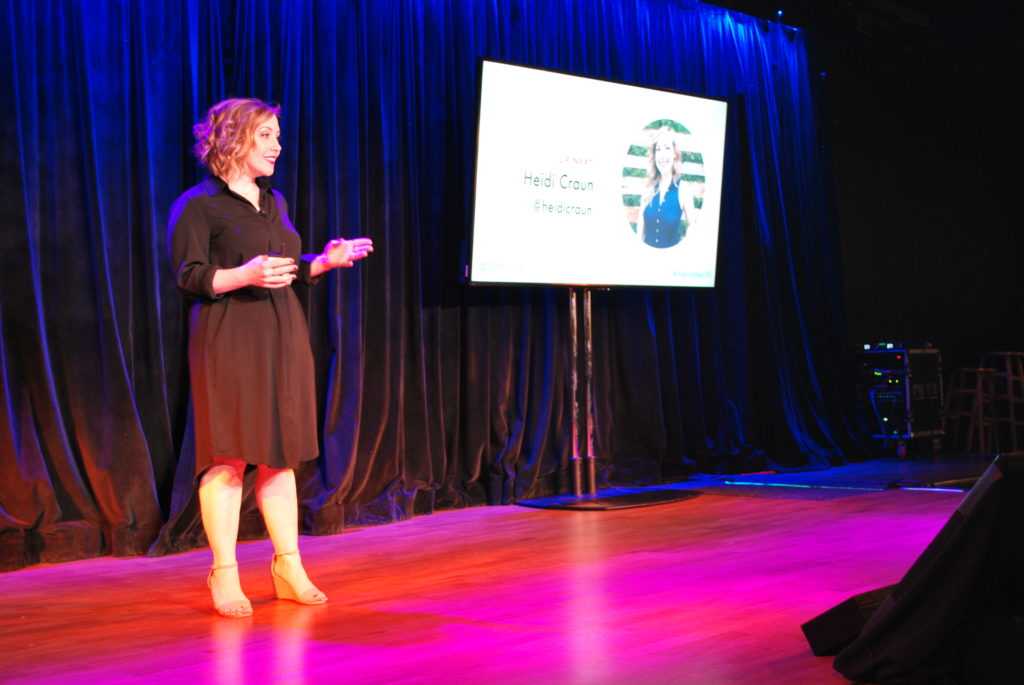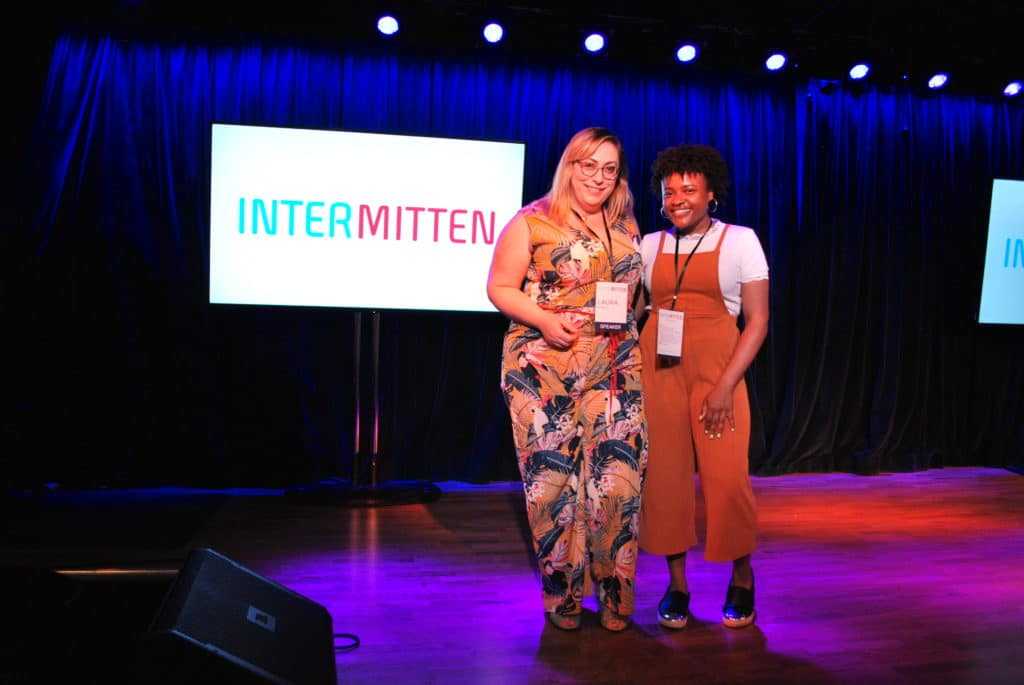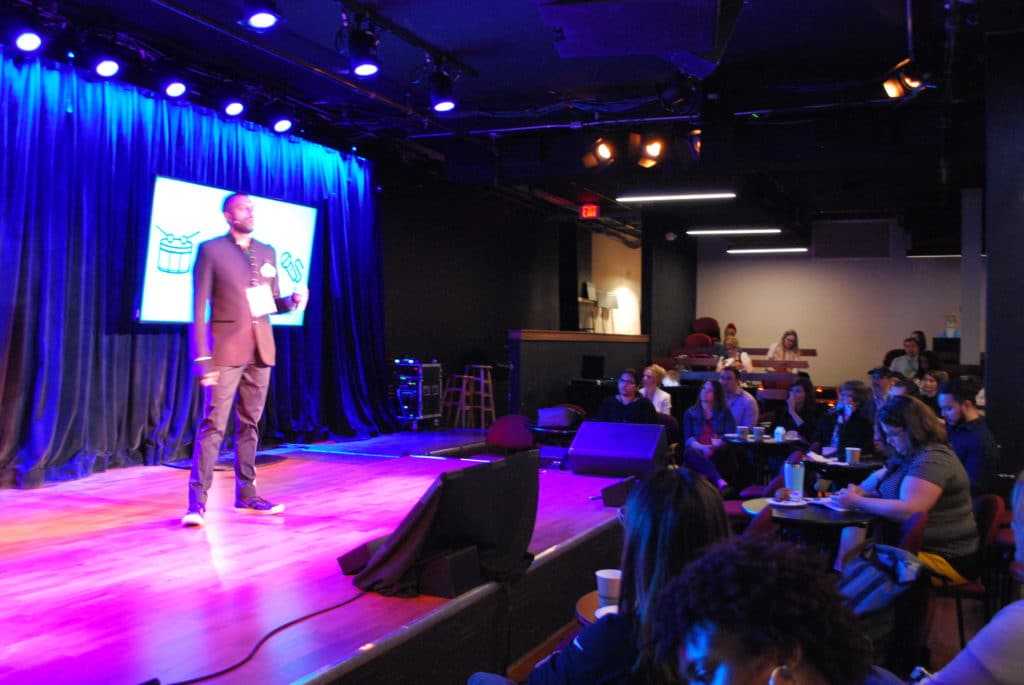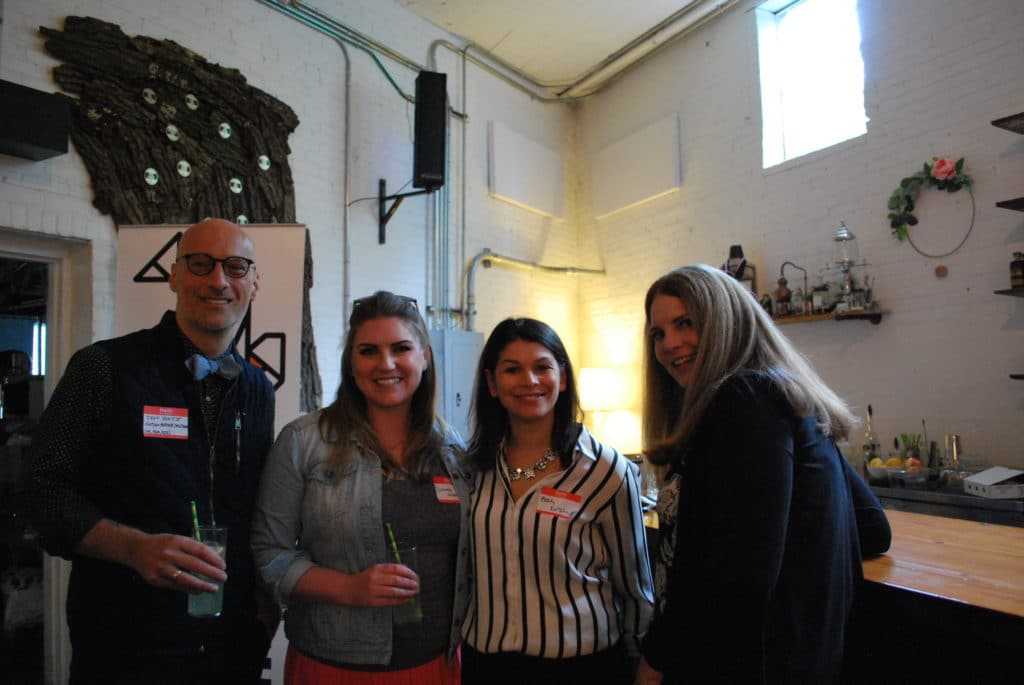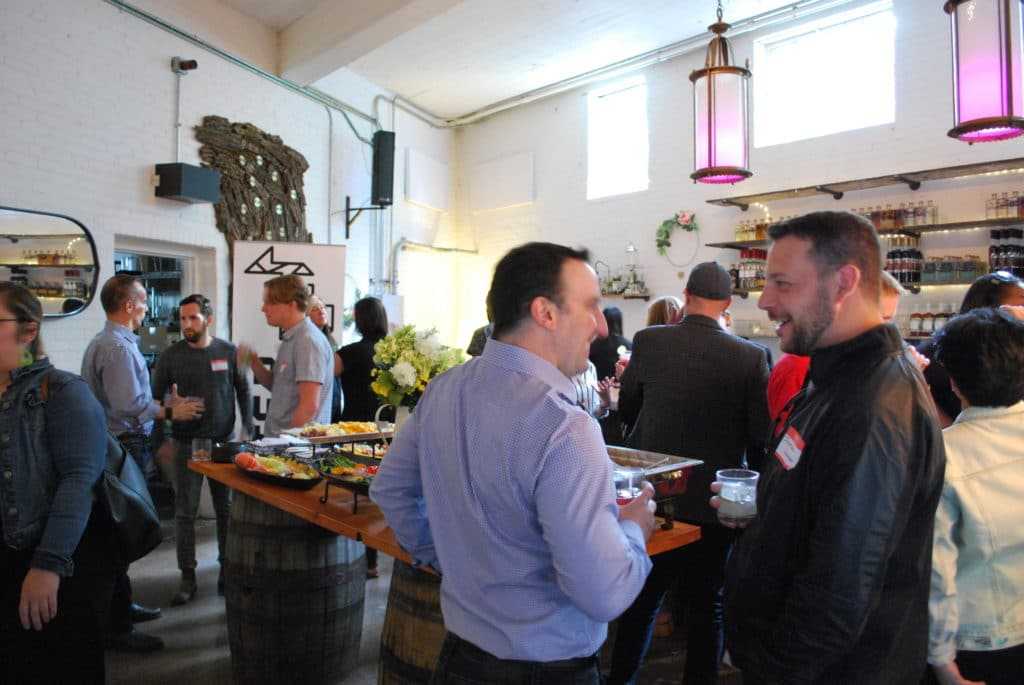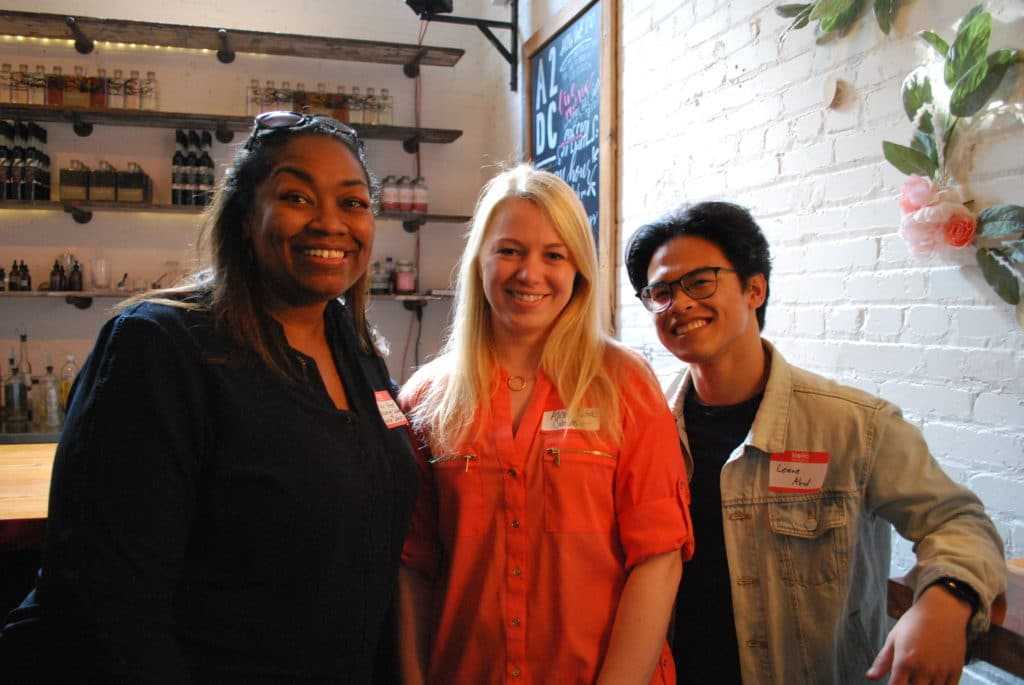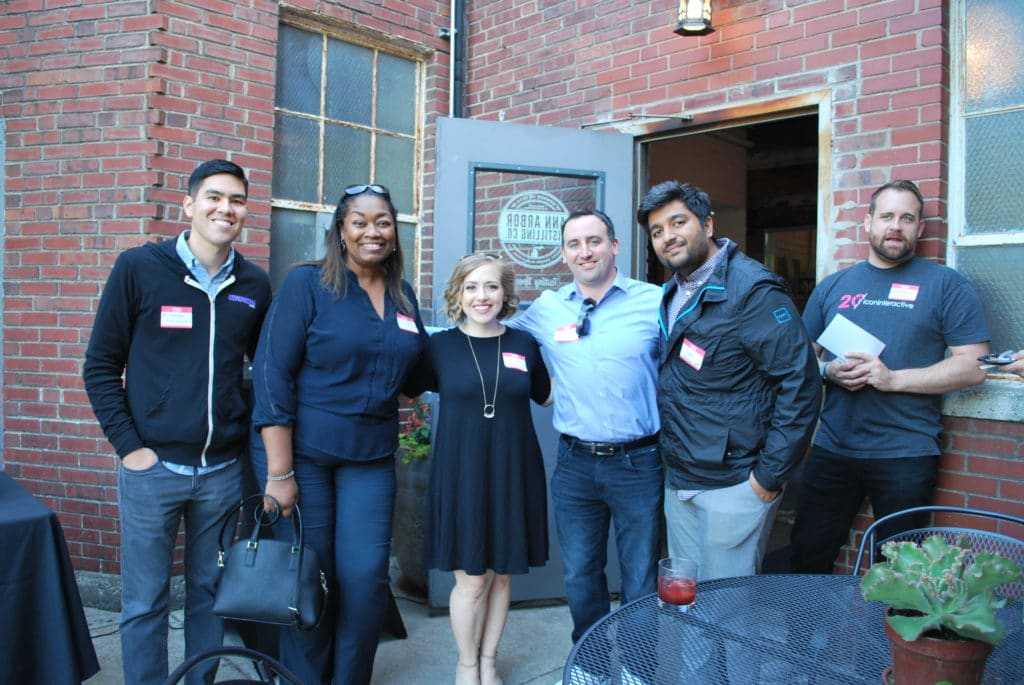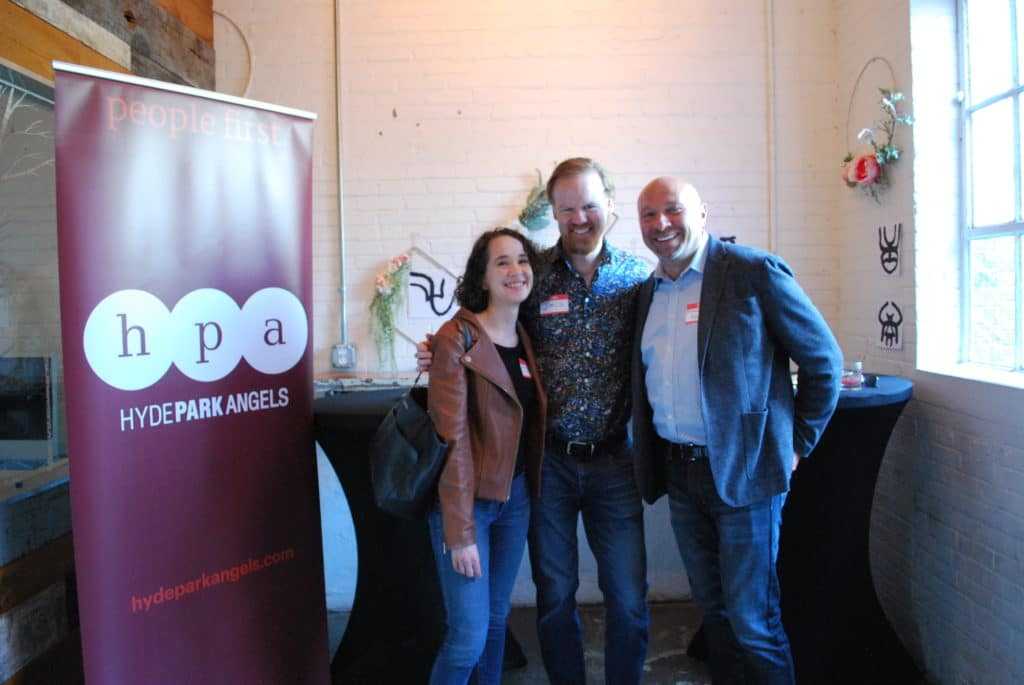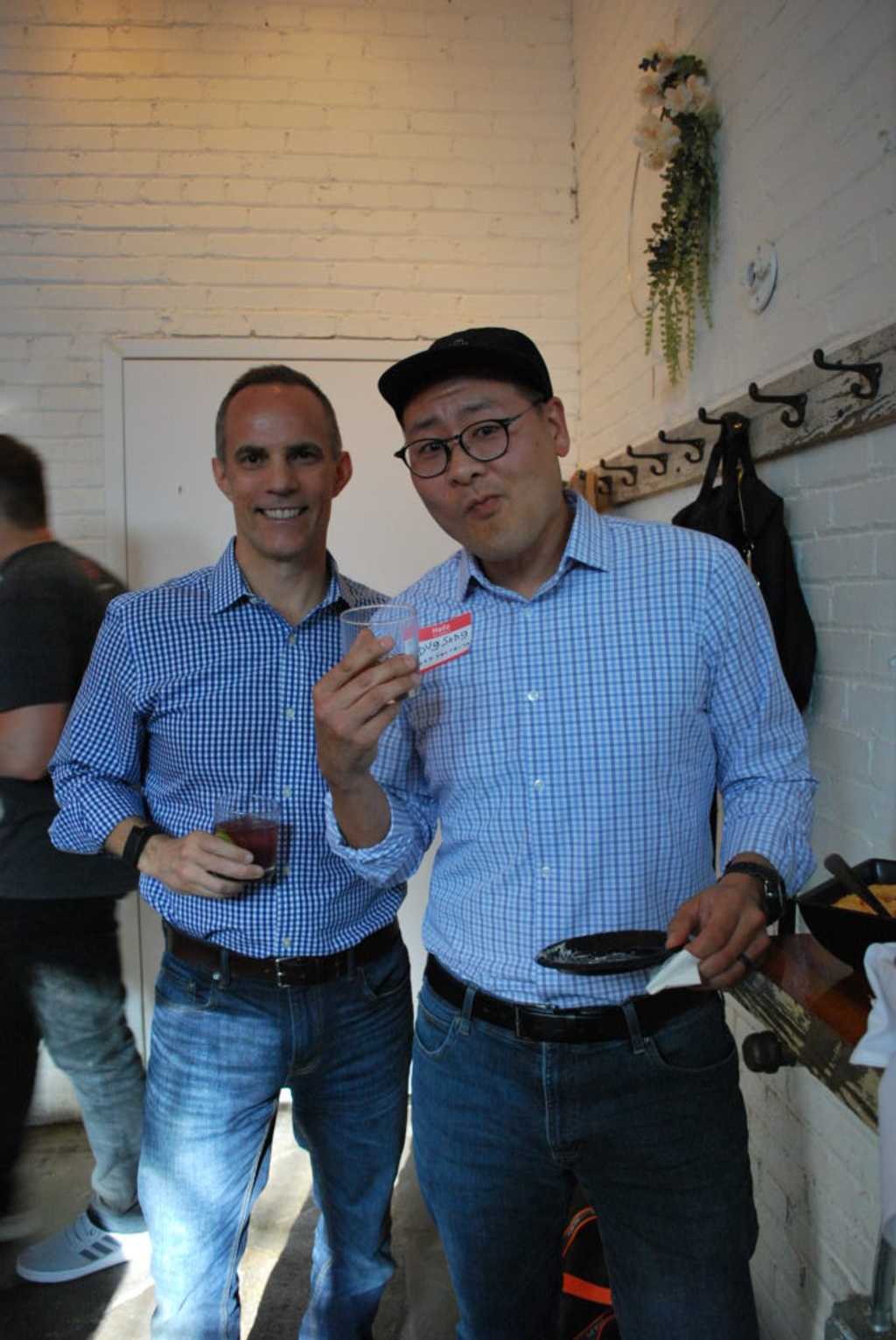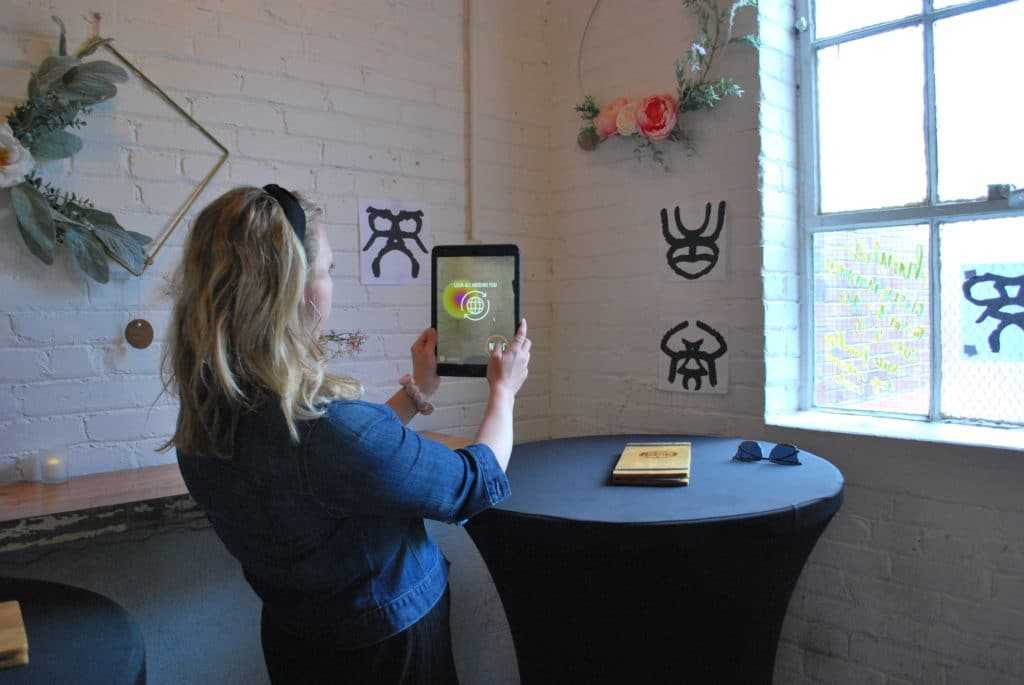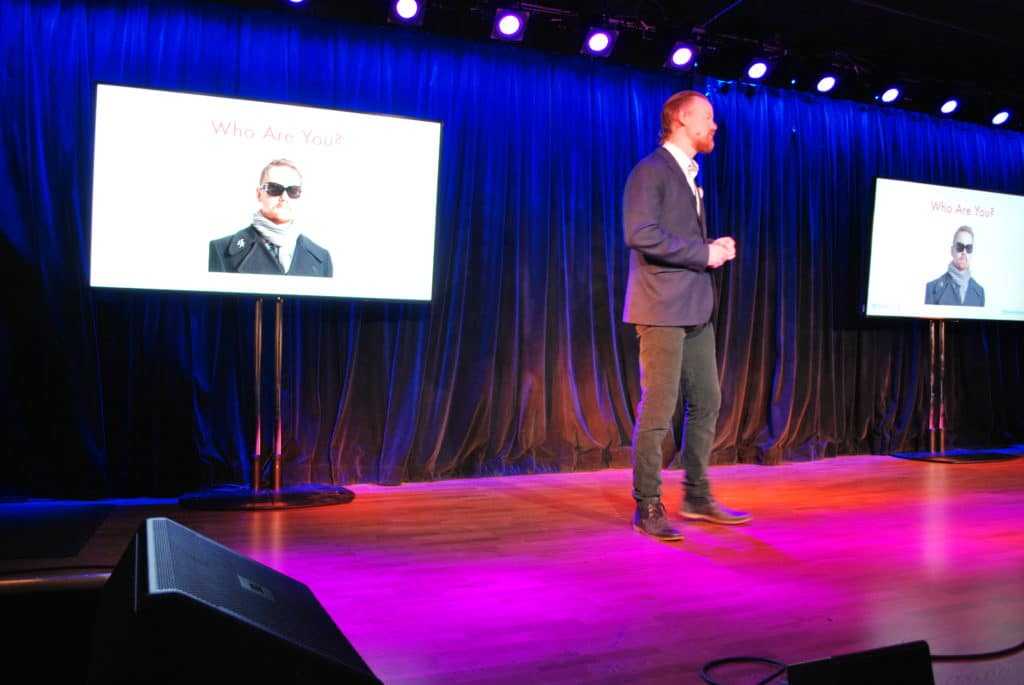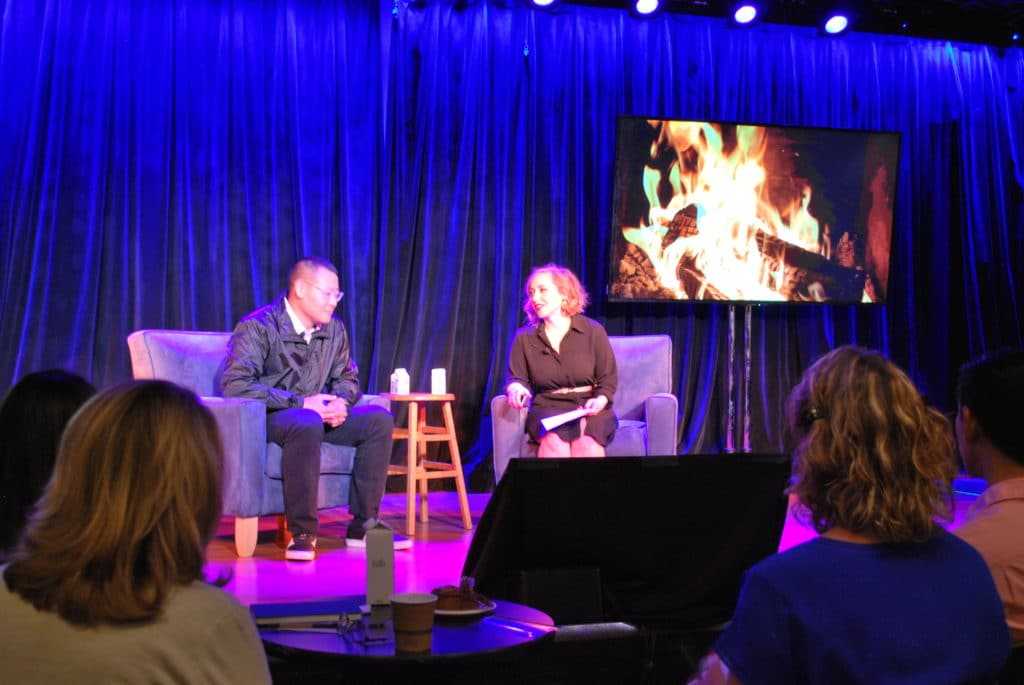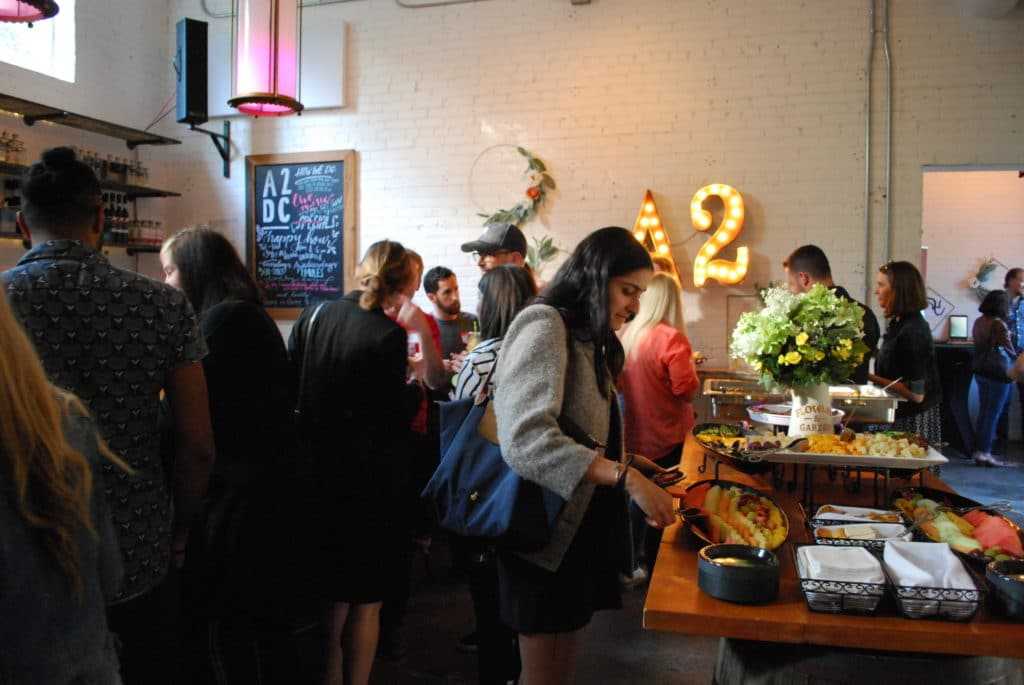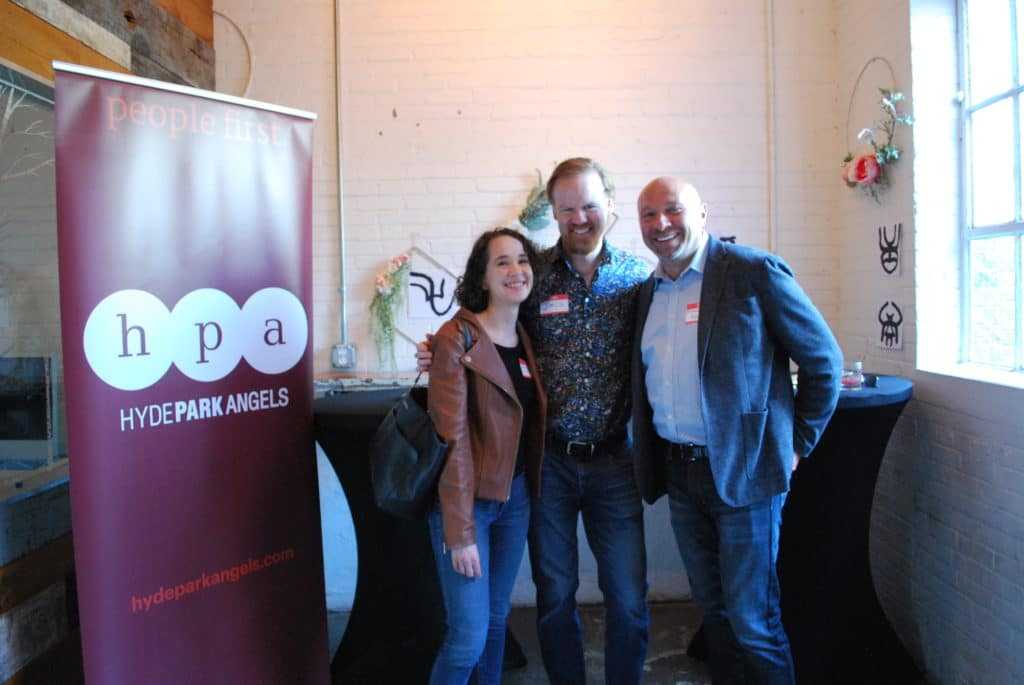Behind The Scenes Intermitten 2019: The Conference for Changemakers
By Laura Cowan
Laura K. Cowan is a tech editor and journalist whose work has focused on promoting sustainability initiatives for automotive, green tech, and conscious living media outlets.
-
Intermitten 2019 kicks off.
-
Intermitten co-founder and president Heidi Craun addresses the crowd.
-
Laura Khalil and young entrepreneur Hunter Phelps on stage.
-
The Ark in Ann Arbor on Main Street.
-
Jim Simpson MC of Intermitten speaks.
-
Jeff Koetje left, Beth Kirsch second from right, at the Intermitten VIP event with colleagues.
-
The Intermitten VIP event at Ann Arbor Distillery.
-
Monica Wheat, Alison Todak of Cahoots, and Leann Abad Michigan Makers Podcaster.
-
Intermitten VIP event June 3. Heidi Craun center.
-
Olivia Chadwick of HPA stands with Jim Simpson center at Intermitten VIP.
-
Dug Song of Duo Security and colleague at Intermitten VIP.
-
The Icon Interactive VR app in action.
-
Jim Simpson MC of Intermitten, introduces the event.
At the Ark on Main Street Ann Arbor, Intermitten (@intermittenconf/Intermitten Slack) is a gem of a conference all about changemakers in tech, and startup culture in the Midwest. Speakers range from venture capitalists to consultants on culture and inclusion. We were lucky enough to catch up with so many of the speakers and attendees that we will be extending our coverage to features on many of the people we met while at Intermitten and the VIP event the evening before June 3. The Intermitten themes are all about our power to build change into the Midwest entrepreneurial and tech ecosystems as the business culture builds, to learn from and become thought leaders as we all have the capability to be.
Laura Khalil and Hunter Phelps stand on stage at Intermitten.
Introductions were started by Jim Simpson. He is the lead director of product management at Duo Security. “Maybe you’ve heard of our little acquisition,” he joked. “There’s still a lot of soul in the company.” Simpson says he grew up on the west coast, moved to Japan for his formative years, then came back for school. Also, he says, he’s queer. “Change does happen, sometimes it takes a long time.”
"The mission of Intermitten is to unite the Midwest entrepreneurial community, nurture its growth and highlight it as a hub of and destination for thought leadership and talent,” he said. Laughter broke out at the mention of the Midwest actually having an entrepreneurial hub, often challenged on the coasts because of the lack of visibility of the growth of tech towns outside Silicon Valley and because of the smaller pace of growth and lower critical mass of tech companies outside the Valley that people in tech hear about all the time. “That wasn’t supposed to be a joke,” Simpson laughs. “We do actually have one.”
Monica Wheat of Backstage Capital, Alison Todak of Cahoots, and Michigan Makers podcaster and founder of ASHE Media Leann Abad pose at the Intermitten VIP event June 3.
Intermitten co-founder and president Heidi Craun (@heidicraun, formerly Arbornetworks, Duo, Farmlogs, and now HPA) introduced the events. “We’re not all tech, we’re not all artists,” she said, “but what everyone is who comes to Intermitten is someone who wants to make a change in the world.” “We all are or can be changemakers. It’s in what we do, not what we say,” she said. “You’re a changemaker when you stand up for a marginalized employee… when you give every employee equity, when you decide to do something you’re uniquely positioned to do but scares the shit out of you.”
“There is an unprecedented amount of money coming into the Midwest ecosystem. Duo's acquisition was for nearly two and a half billion. Since then we’ve seen more: StockX, Rivian, and OneStream. The momentum is building, because it breeds success. Silicon Valley is seeing mixed results because not everyone has access to the same resources that keep up with the rampant cost of living. In Silicon Valley it is mostly white men at the top. Not only is this disparity of success morally bankrupt, but it’s bad business. Diverse businesses run by women and minorities outperform 35% and 15% respectively. Companies with women on the board see 36.4% greater returns.”
Heidi Craun introduces the events at Intermitten 2019. "We are all agents of change," she says.
People who are different than us encourage diverse perspectives. People who can offer change aren’t going to participate if they don’t feel valued and like they belong, Craun says. "We already see signs of the Midwest taking the same path as the Valley. Affordable housing in Ann Arbor is nearly nonexistent. We have the benefit of seeing the mistakes of Silicon Valley and learning from them now. With the influx of coastal investment and the talent circulating in our ecosystem, it is imperative that we approach next wave of innovation from the lens of social equity.”
Raj Nathan (@RajNATION), named an “agent of change" by Huffpost, featured in Inc, Forbes, and host of StartupHypeman the podcast opened his talk by rapping from Hamilton. He's a yoga instructor and rap artist in addition to working in marketing and branding, and he sees a company's pitch as entertainment, as parallel to a song with a hook. "It's about talking to the right people with the right message at the right time," he says.
People gather for Intermitten 2019 at The Ark in Ann Arbor.
We met Nathan the night before at the Intermitten VIP event at the Ann Arbor Distillery. “Don’t Throw Away Your Shot: Make Your Pitch a Performance,” he told us was the name of his talk. “Think about what goes into a song,” he said. Working with beat, bridge, hook, and verses, you can capture what’s important about your company in a form that engages people the way music does. You can visit Nathan’s website for a free download of a 10-minute “sass masterclass.” “You create the song of your company,” he tells us. “As a yoga teacher as well, I’m thinking about how to bring out expression in people through the vehicle of storytelling. Even in yoga, every pose builds and tells a story.” It’s responsive as well. Nathan says he watches when students in a yoga class respond to the first few poses, and adjusts the routine according to the mood. The same thing happens when you pitch your company. Nathan says that the key to his work in branding and marketing is to see pitches for business as a form of entertainment, to always pay attention to the hook.
“Think about what goes into a song,” he said. Working with beat, bridge, hook, and verses, you can capture what’s important about your company in a form that engages people the way music does.
Dug Song, founder of Ann Arbor's first billion dollar plus valuated unicorn Duo Security, sits down with Intermitten founder Heidi Craun for a fireside chat on financial and social equity.
"Equity is ownership. Many tech companies don't share ownership," Dug Song said in his fireside chat about using financial equity as a tool of social equity in tech. "There's this ethos of broad based ownership. Most tech companies you find today up to the point of IPO or acquisition are basically giving employees ownership. It's strange that other companies don't do this.... At the end of the day when we're building companies, we should be thinking about building platforms of opportunity for everybody." This typically comes in the form of stock options. Song said that when you look at employment offers from tech companies, you find there are 3 components: base salary, bonus, and equity. "The equity component is a lottery ticket. You put it in your back pocket and forget about it. Most venture-backed companies fail. It's the tenth that will return the entire investor's fund, which is why they're looking for such outsized and out-scaled returns. When that happens you want the success to flow through and the impact to be larger than for the people who started the business."
"Did a lot of people make a lot of money [off the Duo acquisition]? Yes," Song jokes. It's the topic everyone wants to know about. "We had hundreds of people who made a significant amount of money. The outcomes of an exit like that are not just about financial participation. Having ownership isn't just about the money that will come to you but about the opportunity to take ownership and responsibility. In any fast-growing startup, there's no way people can stay on top of it all. We all have a sphere of influence but our job all of us at Duo is to make decisions on behalf of the company that drive us forward. The reality is that you have to push that down. There's no way in a business like us--9 years ago we were 3--it's an ownership culture. We need a culture where people are empowered to be owners. The broader outcome of a journey like Duo's is that these people have built the experience they need to do the next set of businesses. We need a lot more [companies like Duo] to achieve economic justice, but it's difficult."
Hanel Baveja of Insight Partners, invested in Clinq's Series B.
While at the VIP event, we met Hanel Baveja, who is part of the Insight Partners funding of Clinq. We asked how they heard about the company in an ecosystem with sometimes little communication or funding opportunities between the coasts. Her father was a former CS professor and recommended they check out Clinq, she says. “It was easy to see they were a big company,” she tells us, “an 80-person team.”
Beth Kirsch, Community Engagement Coordinator of Netscout, (Bar Louie for Tech Trek) said she would be speaking about the culture shock of acquisition. How do we navigate a time of culture change in an organization when it’s so easy for things to fall apart? Kirsch told us the key is to approach it with intentionality and to have someone in key situations such as in the room when the terms of an IPO are worked out, to be proactive and get ahead of it, and to keep doing what worked previously that employees value. You offered free coffee or other perks to employees? Keep doing that. Make sure that things that are important to you as a company are a part of the conversation as you are acquired.
Speaker Laura Khalil is a "Force of Badassery." She says she went into consulting on verbal self-defense for women in tech because of an experience she had where she was put on probation and then fired by a large tech firm for being not rude but too bold and assertive in the boardroom. “This is the art of learning how to respond when we feel stunned into silence.” This technique functions for situations where women feel ignored, minimized, berated, talked down to, or catcalled.
“This is the art of learning how to respond when we feel stunned into silence.”
Jeff Koetje left and Beth Kirsch center right pose with colleagues at Intermitten VIP.
“Respond with a question,” she says. “This is for men too, when they don’t know what to do. You throw the energy back and refocus it as a question. 'Do you know how that makes me feel?' We learn how to deescalate and respond. It doesn’t take a lot of thought when you’re stunned. Someone says to you women don’t belong in engineering. Possible responses? ‘Do you know how you sound?’ ‘That makes me uncomfortable.’” This takes the pressure off, though if you feel your life is in danger, Khalil says people need to get out, call 911, and decide if it might be more powerful in some situations to stay silent.
Jeff Koetje of Kaplan Partner Solutions consults with educational institutions on how they can become more aware of blind spots in how they act as agents of promoting legacy systems of oppression such as structural racism or sexism. “No one’s lens is definitive,” he says, “and we’re not looking to erase differences.” The key is to engage with people who are not normally part of our lived experience to offer ourselves new perspectives, and then do the internal reflection to help ourselves become more aware of our blind spots.
The key is to engage with people who are not normally part of our lived experience to offer ourselves new perspectives, and then do the internal reflection to help ourselves become more aware of our blind spots.
Bess Goodfellow of HPA, a sponsor of Intermitten based in Chicago said she was excited to be a part of the Ann Arbor tech scene. “There’s a lot going on here, and I’m excited to be a part of it and support it,” she said. Intermitten MC Jim Simpson center.
For example, how does someone write code for a social media platform while keeping in mind how it might be used to oppress minorities? “How do we make sure what we create doesn’t replicate the current system?” Koetje says. “Tech companies are in crisis because they didn’t go through the process of what are the biases we are encoding?” Even as simple as a cisgender white male assuming that because he can walk through the world mostly unmolested, that the same will be the experience of underrepresented people using his social media platform. “How do we do the work within ourselves to undo systems of oppression?” he says. Indeed, most people don’t show up trying to be racist, but might discover down the line they are acting de facto as agents of a system that operates with some form of legacy discrimination. “A lot of programs for inclusion focus on numbers of women and men in tech,” he says. “This process of engagement and reflection moves us past operating at the level of representational politics.”
Monica Wheat of Backstage Capital works with a number of Detroit-based companies and nonprofits in the startup space including TechStars, Startup Week in Detroit, Startup Boost accelerator, and Bamboo was scheduled to speak at Intermitten but was called away last minute. We were lucky to catch her at the VIP event the night before to ask about her fascinating career trajectory in business strategy and funding. She works with Startup Week to offer 250 programs in 15 days, which had 12,000 people through last year. “There are a ton of people who want to give time, but there is no way to track it,” she says. “We have been flooded with offers for free legal advice, free marketing help and the like for Detroit startups,” she says, “so my focus right now is making sure these companies know how to build a business when that fades. It won’t last forever.” She’s working to build a database to connect startup founders, funding folks, and other professionals who want to volunteer their time to mentor in a particular area and then ask for something in return. “There are lots of tech-adjascent people here, people with media skills, and we have ten times the people who are willing to moonlight as other regions,” she says. “What do you call that? The Midwest work ethic? I think it was really positive for startup culture here when the economy crashed in 2008 in the sense that Detroit was old money, used to big business, and used to create success mostly through startups being OEM partners. After that point, people were willing to try new things.” Wheat helps companies with analytics and business strategy. She has a long background in evaluating companies from working in commodities trading. “I was an engineer for 20 years,” she says. “Those jobs allowed me to be in an innovation space.” Since 2006, she’s been trying to get people on the coasts to see Ann Arbor Detroit, which she sees as one entrepreneurial region, as viable. She pulls the best she finds from anywhere in the U.S.--Chicago, New York, Miami--to fund. She is hoping that by writing a grant for this database to unify the volunteer efforts around Detroit and various funding options, she can help Ann Arbor Detroit find more cohesion in getting new businesses started.
We met so many people at Intermitten that many of them will turn into futures on Cronicle in the near future, including Dug Song of Duo, who spoke with us after the event on culture change after acquisition. Stay tuned for more in-depth behind the scenes coverage of a2Tech360 this week, and interviews with many speakers and founders we meet this week and beyond.
ann arbor detroit tech, ann arbor tech, april boyle, dug song, heidi craun, intermitten 2019, jeff koetje, laura khalil, monica wheat, raj nathan, tech conferences, tech culture, tech events

